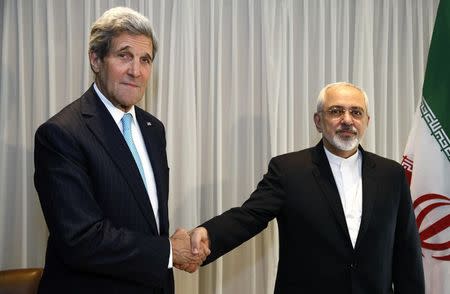By Arshad Mohammed and Stephanie Nebehay

GENEVA (Reuters) – U.S. Secretary of State John Kerry and Iran’s foreign minister Mohammad Jawad Zarif held intensive talks on Tehran’s disputed nuclear program on Wednesday, returning for an evening session before handing off to their deputies, officials said.
Iran and six world powers have renewed their quest for an elusive nuclear deal – seen as crucial to reducing the risk of a wider Middle East war – after negotiators failed for the second time in November to meet a self-imposed deadline.
Kerry and Zarif “had substantive meetings for approximately five hours today and they discussed a broad range of issues with a small group of staff from each side,” a senior State Department official said.
But Kerry later unexpectedly returned to the Geneva lakeside hotel for a third meeting lasting some 90 minutes with Zarif after briefing senior U.S. negotiators ahead of their technical-level talks scheduled with Iranian counterparts for Thursday in the Swiss city.
“Secretary Kerry and Foreign Minister Zarif reconvened this evening to continue discussion about the nuclear negotiations in advance of the start of the next round of talks tomorrow,” a U.S. State Department spokeswoman said.
Wendy Sherman, acting deputy secretary of state, and deputy foreign minister Abbas Araqchi are to lead their delegations at Thursday’s talks, to be followed on Sunday Jan. 18 by wider talks between Iran and major world powers.
As the two sides met in Geneva, Iran’s judiciary indicted American journalist Jason Rezaian and sent his case to be tried in a hardline Revolutionary Court, the official IRNA news agency reported late on Wednesday.
Earlier Zarif said that serious dialogue with the West would be easier if it respected Muslim sensitivities, ruffled by the latest Charlie Hebdo cartoons.
Speaking to reporters before talks began, Zarif said the meeting would help gauge whether both sides were ready to advance toward a deal to curb Iran’s nuclear program in exchange for sanctions relief.
“I think it’s important. I think it will show the readiness of the two parties to move forward and to speed up the process,” Zarif told reporters.
The two men took a break from hotel talks for a 15-minute joint stroll through downtown Geneva during the afternoon.
“We are working hard,” Kerry told a journalist during the walkabout, which took them along the Rhone River flowing out of Lake Geneva, according to a U.S. official.
The sought-after agreement, whose new deadline is June 30, would gradually lift tough financial and trade sanctions imposed on the Islamic Republic since 2006 in exchange for verifiable limits on its enrichment of uranium to ensure it cannot be put to developing nuclear weapons.
The Islamic Republic says it wants only civilian energy from enrichment, denying Western suspicions of a secret bomb agenda.
Zarif also sought to explain why Iranians are dismayed by the cover of French satirical weekly Charlie Hebdo’s Jan. 14 edition, which features a cartoon of a tearful Prophet Mohammad with a sign “Je suis Charlie” (I am Charlie) below the headline: “Tout est pardonné” (All is forgiven).
Many Muslims regard depictions of Mohammad as blasphemous.
Seventeen people died in violence in Paris last week that began with a Jan. 7 attack by two Islamist gunmen on the offices of Charlie Hebdo, in which 12 people were killed including the journal’s top cartoonists, and ended with a siege at a kosher supermarket on Jan. 9 in which four people died. A policewoman was also shot dead elsewhere on the street. All three gunmen involved were killed in raids by French special forces.
“We believe that sanctities need to be respected,” Zarif said. “We won’t be able to engage in a serious dialogue if we start disrespecting each other’s values.”
































